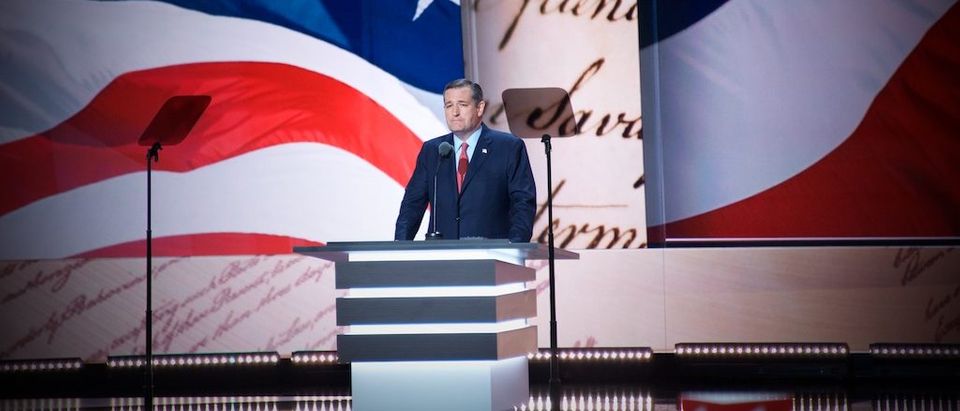What was anticipated to be a high-minded call for Republicans to keep the flame of conservative principles from being extinguished and the Constitution from being compromised, became Ted Cruz’s “Kanye West” moment Wednesday night. And the fallout from his skulduggery became a bona fide “Seinfeld” moment Thursday morning.
It was the episode where Jerry takes a polygraph test, insisting that he had never watched the prime time soap opera, “Melrose Place.” Even though expertly coached by his prevaricating pal George Costanza — “Just remember, it’s not a lie if you believe it” — under the pressure of repeated questioning and wild swings of the needle, his falsehoods became so obvious, he finally exploded into a rambling confession.
“Lyin’ Ted,” as it turned out, couldn’t hold it together any better than Jerry. The morning after his disgraceful, disparaging “toast” at Donald Trump’s political wedding, he gave a lawyerly defense of his actions: another round of sanctimonious speech about the primacy of the Constitution, the sacrosanct nature of a man’s conscience — yada, yada, yada.
Then, after incessant grilling by a few in the Texas delegation, he finally cracked, admitting that YES! — it was NOT about the Constitution or his conscience — he reneged on his pledge to support the Republican nominee because Trump had gone after his wife and father in a vicious way during the Indiana primary in May.
If that’s truly the reason — if Cruz had been so blindly enflamed by some noble and primal urge to defend the honor of his wife and father — why didn’t he do something about it at the time? More, that is, than trading schoolyard insults with his “sniveling coward” of a rival.
Winning the Indiana primary would have been a good start.
Crossing over Illinois into duel-friendly Missouri with Trump, as Abraham Lincoln and his mortal political enemy, James Shields, did to fight to the death with cavalry broad swords in 1842 — over a claim by a fictional character Lincoln created in a newspaper story that “Shields is a fool and a liar” — might have actually won Cruz the Indiana primary, had he survived.
And if he hadn’t survived, he’d not only have his honor intact — and that of his wife and father — he’d go down in history as an American hero of “conscience” — you know, that thing that causes honest people to sign pledges and give their word as their bond.
Instead, he decided to burnish his credentials as the most hated man in Washington by lying in wait for three months to sabotage the Republican convention, open the party up to national ridicule and, most unfortunately, steal the news cycle thunder from Governor Mike Pence — an ideological compatriot of Cruz whose chance to introduce a true conservative voice to the Republican presidential ticket was diminished without a second thought by the ever “conscience-bound” senator.
Obviously, the ambitious ragings in Cruz’s megalomaniacal mind compelled him to do his vengeful dirty work on a grand scale far above the petty poutings of a John Kasich or Jeb Bush, to once again satisfy his craven craving to assert his preeminence in all things political.
The only question that remains is whether Donald Trump and Paul Manafort were bamboozled by Cruz, or whether they had read his speech — which both of them, and Cruz himself, claim they had — and let Cruz proceed with it anyway, knowing that it was a win-win for the Trump campaign.
If Cruz endorsed Trump, that would be good. If he didn’t and left the “vote your conscience” dog whistle in the speech, that too would be good, if not better. It would cause an uproar on the convention floor, with even some friendly fire being directed back at Cruz by his own supporters.
Most important, it would get at least sixteen tons of free publicity on broadcast and social media: the coal that continues to stoke the engine of the Trump Express.
As for Cruz, I hope his confession to the Texas delegation was at least good for the soul, because it couldn’t be good for his electoral chances going forward. At the end of the day, Charles Krauthammer may have called it correctly, dubbing Cruz’s convention speech “the longest suicide note in American political history.”
Whether that will turn out to be true, I’m not sure. But, as Seinfeld’s cockeyed optimist, Billy Mumphrey, might say, “Hope springs eternal.”
Timothy Philen is the author of Harper&Row/Lippincott’s “You CAN Run Away From It!” a satirical indictment of American pop psychology. He is currently at work on a latter-day “Walden,” a collection of essays on post-modern American culture.


